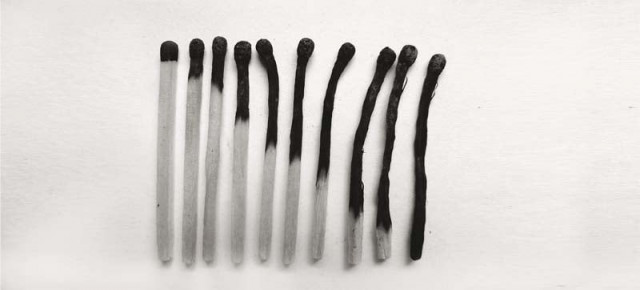Walking the tightrope: Kaniza Bibi among 47 women on death row in Pakistan
The thin line between death penalty and gender-based violence

The thin line between death penalty and gender-based violence. DESIGN BY MARYAM RASHID
Most of these prisoners are accused of murdering family members or husbands. They have been unable to hire lawyers to plead their cases because of extreme poverty, say interior ministry officials and representatives of civil activist groups. And sooner or later, the Punjab Home Department will hang them under the government’s National Action Plan, which was formulated in the aftermath of the brutal Army Public School massacre in Peshawar on December 16 last year.
“Kaniza Bibi recognised me but could not speak or hear me. Police not only harassed her, but also brutally tortured her in jail,” alleges Kaniza’s cousin, 25-year-old Parveen Bibi, while speaking to The Express Tribune.

Parveen says her mother told her Kaniza was arrested in 1989, before Parveen was born. Kaniza was sentenced to death for murder under Section 302/34 of the Pakistan Penal Code. Not a single member of Kaniza’s immediate family is alive, adds Parveen, claiming that jail authorities issued Kaniza’s black warrant despite her long history of mental illness. She recalls the time when the President of Pakistan at the time, Pervez Musharraf, rejected Kaniza’s plea for mercy. She says the entire village mourned the decision at the time. Around 50 other women had filed for mercy according to the villagers, says Parveen, but none of them were granted clemency.
“She (Kaniza) has always maintained her innocence,” says another cousin, 29-year-old Muhammad Munawar, who met Kaniza just before Eid. “Kaniza is almost dead now. Doctors say she suffers from severe schizophrenia.”
Framed?
Kaniza was working at one Khan Muhammad’s residence in Kamila as a housemaid when her employer was accused of killing his entire family because he wanted to marry a girl from the same town, Munawar quoted the police as saying. According to the police statement, Khan allegedly killed his five children and his pregnant wife before running away, says Munawar.
The police later arrested both Kaniza and Khan. Khan was executed in 2003, while Kaniza, who was sentenced to death for being an accomplice, still maintains her innocence, adds Munawar. Another relative of Kaniza, however, claims the real killers of Khan Muhammad’s family were Mohammad Habib and Allah Yar, who both died of natural causes soon after the brutal murders. Kaniza’s cousin Muhammad Akram, 47, claims Allah Yar had a family dispute with Khan Muhammad and ultimately managed to send him to jail. Akram also alleges that Allah Yar, who was a landlord in the area, was involved in the murder of two other villagers. “Khan Muhammad was innocent. No one can kill their own family members,” he says.
Other relatives of Kaniza are also of the opinion that both she and Khan Muhammad were framed for murders they did not commit. They say Mohammad Habib and Allah Yar were initially arrested for the offence but managed to obtain their release by bribing the local police and then filing a false police report implicating Khan Muhammad and Kaniza. The police, on the other hand, say there is no record of the case at the Kamila Police Station. Wishing to remain anonymous, police officers on duty said that since the case is two-and-a-half decades old, the file has perhaps been closed and the case gone to superior court. When approached, family members of Mohammad Habib and Allah Yar refused to comment, saying the case has been closed now.
Forced confession?
One of the counsels for Kaniza, Justice Project Pakistan’s Namra Gilani says her client’s mental health is deteriorating with each passing day. She adds they are also planning to move a petition to incumbent President Mamnoon Hussain to review the case. Gilani says Kaniza’s health worsened after she was sentenced to death. Jail authorities and paramedics, too, are concerned about Kaniza, she says. “I visited her as her counsel but she is too ill and unable to record her statement. A fresh PIMH report prepared by a medical board also states Kaniza cannot be executed due to her poor mental condition.”

Kaniza’s diagnosis of paranoid schizophrenia has been confirmed by successive medical boards, claims Gilani. In the report sent to the superintendent of Kot Lakhpat Jail, the PIMH wrote that the patient has lost her ability to understand what is going on around her and is even unable to feed and clothe herself. The medical report also confirmed that Kaniza hasn’t spoken a word in the last eight years, says Gilani.
Kaniza’s extended family claims she was tortured while in custody to extract a confession. They say she was tortured so brutally at one stage that she had to be admitted to a hospital. Although Kaniza initially challenged the confession, saying it was involuntary, the court relied on it while handing the death sentence to her and Khan Muhammad.
International concern
Another woman prisoner on death row is Aasia Bibi, a Christian accused of blasphemy in 2009 and sentenced to death by a district court judge the following year. Her case has garnered a lot of international attention, with many rights groups flaying Pakistan’s government for failing to protect minorities. The Supreme Court of Pakistan has now decided to hear the appeal of her high-profile case after the Lahore High Court upheld her death sentence last year. Other cases of female inmates on death row are also pending in the Supreme Court. Unlike Aasia, these women have no legal assistance, with no one pleading their cases. Gilani said these women would have won their cases had someone been representing them.

“Pakistan’s return to using the death penalty, an inherently cruel and irrevocable form of punishment, has been a tragic setback for human rights in the country,” says Andrew Stroehlein, European Media Director of the Human Rights Watch.
Amnesty International’s Press Officer Asia/Pacific, Olof Blomqvist stresses that the government should impose a moratorium on the death penalty with a view to eventually abolish it completely. “Pakistan has gone from being a country that showed real progress on abolishing capital punishment to this year, becoming one the world’s top three executioners — a shameful club no one should aspire to join.”
Research Director at Death Penalty Worldwide of the International Human Rights Clinic, Cornell University Law School, Delphine Lourtau fears the death penalty is being used against women as part of gender-based violence. “Many women are sentenced to death after being found guilty of killing a close family member, often their spouse, in a context of physical and emotional abuse. Only rarely, however, do courts recognise gender-based violence as a circumstance that should lead to lighter sentencing. Moreover, women facing the death penalty are often abandoned by their families and, having no wealth of their own in many cases, find themselves without resources and support required to ensure that they receive a fair trial,” she says.
The government, however, is adamant the death penalty is the only deterrent in the country. “Both, lifting the moratorium and quick executions, are the need of the hour. We are waging a war against militants who are killing our soldiers, our children, our leaders,” stresses Minister of State for Interior Balighur Rehman. “Hangings have not only discouraged militants, but also remain a source for boosting the morale of our forces. We understand the concern of rights groups, but we believe that in war, execution is the right punishment for terrorists,” he said in response to questions from lawmakers in Parliament recently.
Chairperson of the Human Rights Commission of Pakistan, Zohra Yusuf says they have taken the issue up with the Ministry of Interior. “But no one has listened to us. There are only a few prisoners involved in terror-related incidents who have been hanged. Deterrence is very low. We have even protested across the country. Bring the official moratorium back, if abolishment is not possible,” she urges, adding Pakistan should review the cases of individuals for lesser executions. “We wrote to the Ministry of Interior but their response is still awaited.”
The representative for Human Rights Watch in Pakistan, Saroop Ijaz, concurs with Yusuf’s argument. He, too, thinks very few of those involved in terror attacks have been hanged. “It is a new low. Instead of making its citizens safer by reforming the criminal justice system to ensure prosecution and conviction of those involved in terrorist attacks, the Pakistan government went on a killing spree after the horrific Peshawar [Army Public School] attack. Only a small percentage of those executed were convicted of offences related to terrorism. And amongst those executed were juveniles and people with disabilities. The Pakistan government needs to reinstate the moratorium on the death penalty and devise and implement legislative and policy measures.”
Zahid Gishkori is an Islamabad-based reporter for The Express Tribune. He tweets @ZahidGishkori
Published in The Express Tribune, Sunday Magazine, November 15th, 2015.



















COMMENTS
Comments are moderated and generally will be posted if they are on-topic and not abusive.
For more information, please see our Comments FAQ